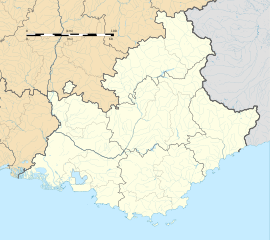La Garde-Freinet

La Garde-Freinet | |
|---|---|
 La Garde-Freinet, seen from the fort | |
| Coordinates: 43°19′03″N 6°28′12″E / 43.3175°N 6.47°E | |
| Country | France |
| Region | Provence-Alpes-Côte d'Azur |
| Department | Var |
| Arrondissement | Draguignan |
| Canton | Le Luc |
| Government | |
| • Mayor (2020–2026) | Thomas Dombry[1] |
| Area 1 | 76.64 km2 (29.59 sq mi) |
| Population (2021)[2] | 1,831 |
| • Density | 24/km2 (62/sq mi) |
| Time zone | UTC+01:00 (CET) |
| • Summer (DST) | UTC+02:00 (CEST) |
| INSEE/Postal code | 83063 /83680 |
| Elevation | 60–674 m (197–2,211 ft) |
| 1 French Land Register data, which excludes lakes, ponds, glaciers > 1 km2 (0.386 sq mi or 247 acres) and river estuaries. | |
La Garde-Freinet (French pronunciation: [la ɡaʁd fʁɛnɛ]; Provençal: La Gàrdia Frainet) is a commune in the Var department in the Côte d'Azur area in southeastern France.
Location
[edit]La Garde-Freinet is a medieval French mountain village, located in the Massif des Maures, 15 km northwest of Saint-Tropez. It is accessible via picturesque winding roads that run through forests of cork, oaks, and chestnuts.
History
[edit]The village was the site of Fraxinet, an Arab settlement of the ninth to tenth centuries. This settlement was used to demand ransoms and assassinate pilgrims and travelers going from France to Italy.[3]
Sights
[edit]Established in the 11th century, the village has preserved its character with its field stone houses, old fashioned street names, and a village square framed with restaurants and local art galleries. From atop old Fort Freinet one can see the plains of Saint-Clément and the Argens valley, all the way to the Alps.
People
[edit]- André Pousse (1919 - 2005) French actor
See also
[edit]References
[edit]- ^ "Répertoire national des élus: les maires" (in French). data.gouv.fr, Plateforme ouverte des données publiques françaises. 13 September 2022.
- ^ "Populations légales 2021" (in French). The National Institute of Statistics and Economic Studies. 28 December 2023.
- ^ Pirenne, Henri (1947). HISTORIA ECONOMICA Y SOCIAL DE LA EDAD MEDIA (in Spanish) (4th ed.). Mexico: Salvador Echavarria. p. 11.
External links
[edit]- Tourist Office La Garde Freinet
- Images of La Garde-Freinet Archived 2016-03-03 at the Wayback Machine (site in French)



